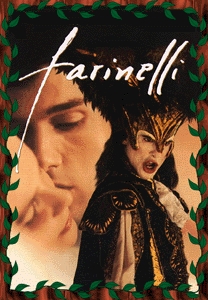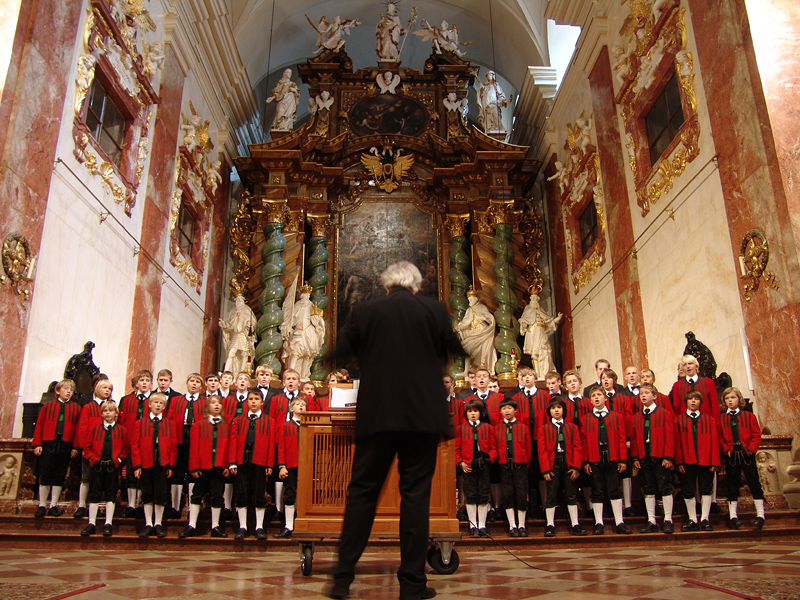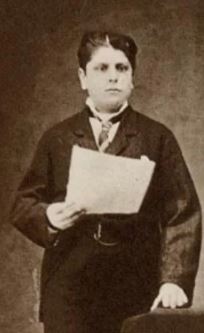Extra activity: the castrati
Who were they?

Wikipedia Film: Farinelli Dominio público
This is one of the most curious aspects of music during the Baroque period (which extended approximately between the years 1600-1750), and indeed during the whole history of music. The castrati were singers who had been castrated as boys before their voice changed. In this way they maintained their boy's voice, with a soprano or alto register (similar to a woman's register) throughout their lives, while at the same time having the lung capacity of an adult.
They were great virtuosos (technically brilliant singers), and they could keep on singing without breathing at all sometimes for minutes at a time. They were a bit like today's pop stars: they were divas who attracted huge crowds, and people sometimes cried or even fainted when listening to them sing.
The most famous castrato was Farinelli, an Italian (his real name was Carlo Broschi) who worked in Spain for King Phillip V. The king wanted Farinelli to cure his melancholy (deep sadness) by singing to him, every night for ten years, exactly the same four songs.
Farinelli
Watch this clip from the film Farinelli. In it he sings the very beautiful aria "Lascia Ch'io Pianga" by the Baroque composer Georg Friedrich Haendel.
It shows what a big star he was and how the audience was fascinated when he sang. The creators of the film mixed the voice of a countertenor (like Jaroussky's voice) and a soprano to try to reproduce what they think his real voice would have sounded like.
During the clip we see how the castration operations sometimes took place (apparently a bath of milk helped with the pain). Don't worry, it isn't too explicit!
Cristian Faur Farinelli Licencia cedida a YouTube
QUESTIONS TO TALK ABOUT IN CLASS
- What do you think Farinelli is thinking while he sings?
- What do you think he feels about it?
Many poor families who had sons who sang well decided they should be castrated so as to be able to have a good job in the future as castrati.
- What is your opinion about castrating boys for them to be singing stars?
The last castrato
Of course, castrating boys is totally forbidden nowadays, although it wasn't prohibited by the Church until late in the nineteenth century.

Wikipedia A boys' choir Dominio público
Taking into account that the castrati were most common and popular about 300 years ago, when recording had obviously not been invented, you think it is impossible to hear a real castrati voice now, don't you?
Well, amazingly, we can hear a real castrato sing today! There are recordings of a real castrato voice!
You would think this is impossible.
The last castrato was called Alessandro Moreschi, he died in 1922, and he was the only castrato to make solo recordings.
Read about him in the following article and then listen to the real voice of a castrato.
Read about the last castrato
READ these comments from the Wikipedia about Alessandro Moreschi.
Click on the "Help" button if you need to.

Wikipedia A young Moreschi Dominio público
Alessandro Moreschi was born into a Roman Catholic family in the town of Monte Compatri in the Papal States, near Frascati (Lazio). It is possible that he was born with an inguinal hernia, for which castration was still thought to be a cure in nineteenth-century Italy. Another possibility is that he was castrated later, around 1865, which would have been more in line with the centuries-old practice of castrating vocally talented boys well before puberty. In any case, much later in life, he referred to his enjoyment of singing as a boy in the chapel of the Madonna del Castagno, just outside his native town........
Critical opinion is divided about Moreschi's recordings: some say they are of little interest other than the novelty of preserving the voice of a castrato, and that Moreschi was a mediocre singer, while others detect the remains of a talented singer unfortunately past his prime by the time he recorded. (Moreschi was in his mid-forties when he made his recordings.) Still others feel that he was a very fine singer indeed, and that much of the "difficulty" in listening to Moreschi's recordings stems from changes in taste and singing style between his time and ours. His vocal technique can certainly seem to grate upon modern ears, but many of the seemingly imperfect vocal attacks, for example, are in fact grace notes, launched from as much as a tenth below the note – in Moreschi's case, this seems to have been a long-standing means of drawing on the particular acoustics of the Sistine Chapel itself. The dated aesthetic of Moreschi's singing, involving extreme passion and a perpetual type of sob, often sounds bizarre to the modern listener, and can be misinterpreted as technical weakness or symptomatic of an aging voice. [1]
[1] Wikipedia contributors, "Alessandro Moreschi," Wikipedia, The Free Encyclopedia, https://en.wikipedia.org/w/index.php?title=Alessandro_Moreschi&oldid=937366796 (accessed February 9, 2020).
Listen to the last castrato
Javier Medina. The last castrato Licencia YouTube
And finally, here is the first part of an excellent BBC documentary about the castrati. Watch it if you like: isn't the subject fascinating?!
greenyedsoul The catrati Licencia cedida a YouTube
Licensed under the Creative Commons Attribution Non-commercial Share Alike License 4.0